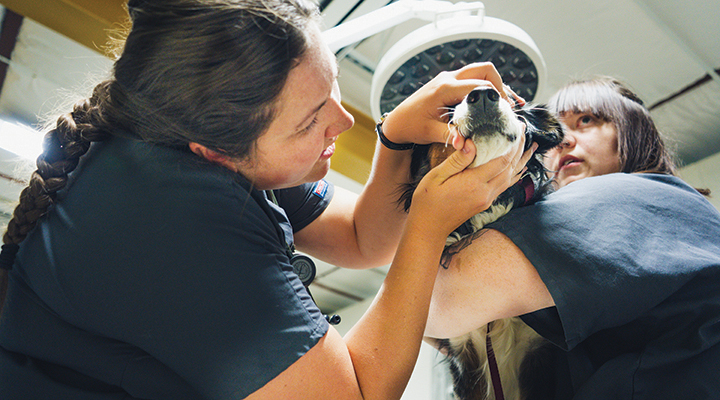By the time the first cohort of five students earn their degrees from the new Veterinary Technology program at Western Colorado Community College the hope is that they’ll also be granted a long-overdue title in their new profession.
“We’re actually trying to get the ‘veterinary technician’ name changed to ‘veterinary nurse,’ because they essentially fulfill all of the duties that a nurse does in a human hospital,” said Dr. Anita Dennison, who became director of the first-year program at WCCC after a distinguished 20-year career as a practicing veterinarian. “When I was in the hospital it often was just me and four veterinary technicians; the same as a human hospital where one doctor might be working alone with multiple nurses.”
The two-year program (which includes two summers) is designed to qualify students to do everything a full-fledged veterinarian can do except perform surgery, provide clients with a diagnosis or write a prescription. Much of the training is provided through hands-on internships at local veterinary healthcare facilities that have partnered with the college.
“It cannot be overstated how important those people are to us and to our profession. They perform tasks that in a human hospital would require several people,” said Dr. Dominic Carrica, whose hospital, Amigo Animal Clinic, is one of two facilities hosting the five students in the initial cohort. “They are nurse anesthetists, nurse dental assistants, X-ray technicians, phlebotomists, they administer medication, place intravenous catheters, administer fluids through complicated pumps…”
“There’s always a shortage of skilled technicians in the veterinary world, which is why we’ve been pushing so hard for this school to become a reality in Grand Junction,” Carrica said. Thanks in part to a partnership with the Mesa County Sheriff’s Posse, students also will learn to treat animals other than just dogs and cats, which is an important component of the WCCC program.
“Western Colorado has a very significant agriculture community, and a lot of our large-animal vets have told us they need technicians,” said Dennison, whose grandfather, father and former husband also were veterinarians. “Our students will learn to treat all animals, then they can specialize in a specific type of veterinary medicine later if they want.”
Amigo Animal Hospital and Mesa County Sheriff’s Posse are the two facilities hosting WCCC’s vet tech students during the inaugural year. Dennison said every veterinary-care facility in the county is expected to partner with the program in the future as classes expand.
Additional information about the program may be found online at wccc.coloradomesa.edu/programs/veterinary-technology.